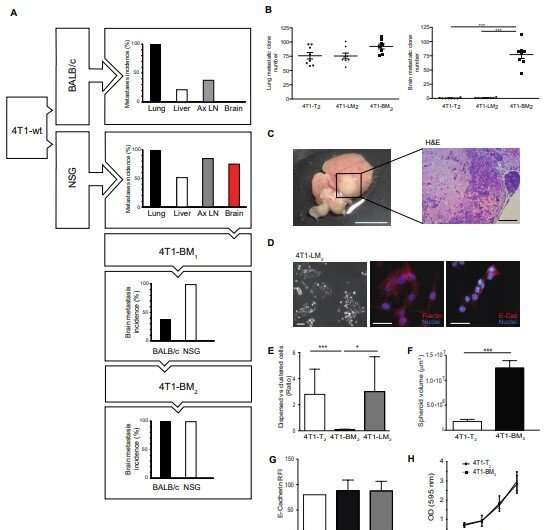Breakaway breast cancer cells can travel to the brain: Scientists plot path in quest to block entry


One of the most puzzling—and devastating—aspects of cancer is its potentially lethal wanderlust, the spread of the disease from a primary tumor to new and distant site.
The process, of course, is formally called metastasis, which at its most basic is recognized as cancer cells on-the-move. Having broken away from a primary tumor these malignant migrants hitch a ride aboard the blood or lymphatic systems to seed new tumors. As countless studies have shown, certain forms of cancer have preferential destinies.
Scientists at Université de Fribourg in Switzerland are studying the development of brain metastases in patients with breast cancer. Knowing how these cancer cells make their way to the brain helps lay the groundwork for interventions that block tumor cells’ well-beaten path. Blocking the cells from a target tissue is vital because metastatic cancer is inevitably worse in terms of its aggression and harder to fight than a primary tumor, oncologists say.
“Brain metastasis is a complication of increasing incidence in patients with breast cancer at advanced disease stage,” writes Dr. Girieca Lorusso whose laboratory focuses on experimental and translational oncology. “It is a severe condition characterized by a rapid decline in quality of life and poor prognosis. There is a critical clinical need to develop effective therapies to prevent and treat brain metastases,” Lorusso added.
Writing in Science Translational Medicine, Lorusso and her colleagues have demonstrated how proteins called connexins orchestrate the spread of metastatic breast cancer to the brain—an event that drastically worsens patients’ prognoses.
In the laboratory, the Swiss team conducted in vitro and in vivo studies to show that connexins and the enzyme focal adhesion kinase—FAK—likely play a major role in the invasion of the brain by cancer cells. Connexins belong to a family of proteins that form intercellular membrane channels permitting the flow of ions and small molecules between adjacent cells.
The Swiss research illuminated how connexin-mediated FAK enzyme activation promoted cell adhesion, tumor-astrocyte interaction, and tumor survival within the brain’s parenchyma. The parenchyma is the functional tissue in the brain comprised of two types of cells involved in cognition and controlling the body. The remaining brain tissue, known as stroma, is the organ’s structural tissue.
Scientists and clinicians have made enormous strides over the past three decades in the treatment of breast cancer, and a vast percentage of patients live normal life expectancies after treatment. Progress with various combination treatments and immunotherapy are among the types of approaches that have helped increased the number of breast cancer survivors several fold.
However, about 30% of women diagnosed with early-stage breast cancer ultimately develop metastatic disease regardless of the site where malignant cells spread, according to Breastcancer.org, an educational resource for patients and their families. Because there are so few cases of male breast cancer, it’s unclear how many of their tumors metastasize, but men are also diagnosed with metastatic breast cancer, additional data from the resource show.
Among the people who develop metastatic breast cancer, about 10% to 15% with stage IV disease have brain metastases. The risk of brain metastasis is usually highest for those with more aggressive subtypes of breast cancer, such as HER2-positive or triple-negative breast cancer, according to Breastcancer.org.
Lorusso and colleagues, meanwhile, found that connexins activated by the enzyme FAK, can in turn, stimulate signaling pathways that sustain breast cancer cells in brain tissue. The team proved in three different mouse models that connexin proteins drive the spread of breast cancer cells to the brain. When the mice were treated with inhibitors of FAK, an approach already being tested in human clinical trials, the growth of metastatic breast cancer cells was suppressed in the brain.
“There is a critical clinical need to develop effective therapies to prevent and treat brain metastases,” noted Lorusso, who also emphasized that the team’s animal model of breast cancer metastasis has been instrumental in uncovering molecular mechanisms guiding metastatic dissemination and colonization of the brain.
In light of clinical studies already underway with FAK inhibitors, Lorusso and colleagues look forward to further therapeutic use of these molecules. “Systemic treatment with FAK inhibitors reduced brain metastasis,” Lorusso wrote.
“Considering the limited therapeutic options for brain metastatic disease in cancer patients, we propose FAK [inhibition] as a therapeutic candidate to further pursue in the clinic,” Lorusso and her collaborators concluded.
They suggest FAK inhibitors are likely the most promising strategy for clinical translation at the moment because connexin inhibitors are still unavailable for humans, and the side-effect profile has yet to be established.
More information:
Girieca Lorusso et al, Connexins orchestrate progression of breast cancer metastasis to the brain by promoting FAK activation, Science Translational Medicine (2022). DOI: 10.1126/scitranslmed.aax8933
Journal information:
Science Translational Medicine
Source: Read Full Article